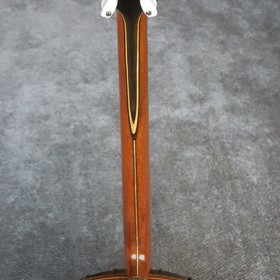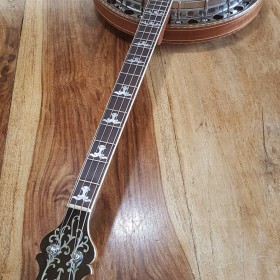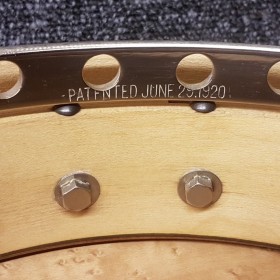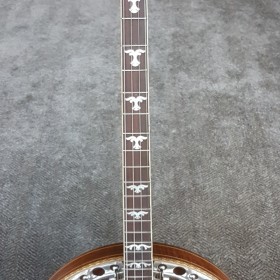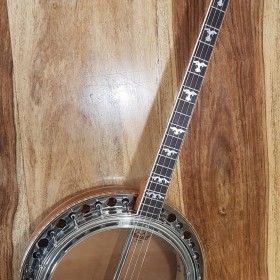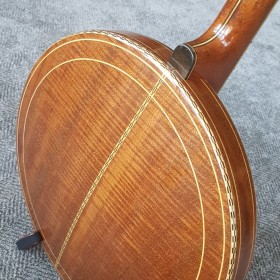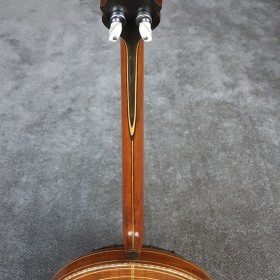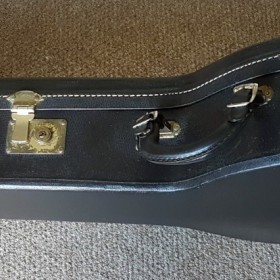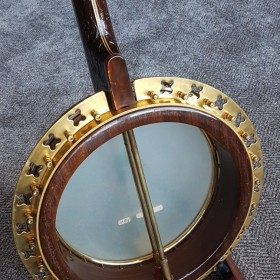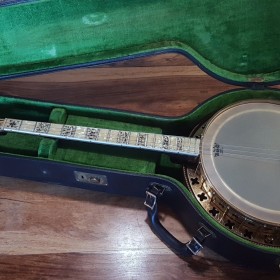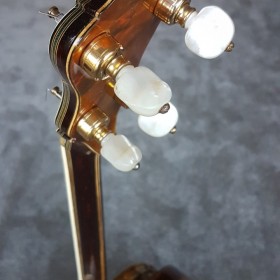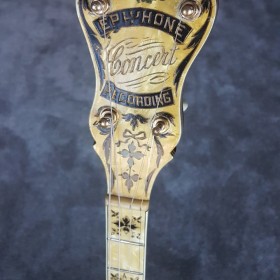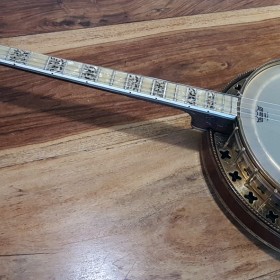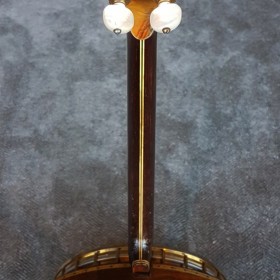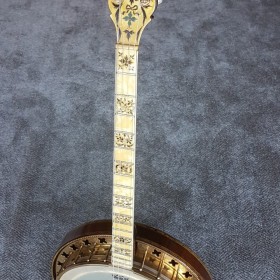Majestic Tenor Banjo
|
A little piece of history
19 fret tenor banjo from 1920’s made by the Puntolillo Company, New York. Around 1924 Puntolillo began building S. S. Stewart branded banjos and did so for several years, the Stewart Wondertone models are Puntolillo products. Before the big 20’s tenor banjo boom he was making open back 17 fret models under the names The Bell and Princess and they had a different tone ring design than Puntolillo’s later 1920’s 19 fret tenor banjos. In the 20’s, of course, he had his own Majestic line and also produced banjos named Regina and Symphony. I suspect his instruments were an inspiration for the Clifford Essex Paragon as some models have the same vertical holes through the rim.
It’s archtop tonering patent was issued in 1920 to Gaetano F. Puntolillo and it is this which gives this instrument its unique tonal qualities. I would put this banjo on a power with most professional level banjos, it has a sweet sustain with bass resonance and a rich soft tone. His work is more creative, even fanciful, than many builders of his period. People have asked me from time to time to recommend a good quality tenor banjo and of course this could open a never ending debate. Of lately I have been setting up, servicing and restoring quite a few of the Majestic brand banjos for customers and they are truly individually, little understated treasures. If Puntolillo was alive today I would market his instruments, I have this one for sale and another Deluke model on-route from Canada.
Banjo details
Flat bar archtop tone ring with side holes seated on metal grommets. In addition to the tonering the maple wooden rim is fitted with a nickel plated spun-over all in one flange which adds to the tonal values of this fine tenor banjo. It is in incredible condition for an early 1920’s vintage instrument which has been very well cared for over the decades.
The five piece neck is constructed from mahogany with double centre ebony strips and maple centre, with cream binding and triple wood laminate along the rosewood fretboard, which is perfectly straight with nice low playing action. The position markers have nice bird shaped mother of pearl inlays and there is little wear to the original vintage frets. The head stock is very tastefully decorated in beautiful mother of pearl floral inlay bearing the name ‘Globe’ (see foot note). The side walls of the stock head is horizontally multi-laminated in ebony, maple highlighted with a nice white binding edge. The original pancake tuners which may have stopped working over the years have been replaced with Grover type geared tuners which probably work much better at keeping tune.
The rim construction is 3/4 inch thick maple multiply laminate with outer mahogany veneer, housing the 20 circular shoes, hooks & nuts which remarkably resemble the Bacon & Day type. This lends me to think that Puntolillo bought various parts from Fred Bacon’s banjo company. The neck is attached to the rim by a centre 1/2″ circular bar. The construction of the multiply mahogany resonator is beautiful, centred maple circles and intricate wood marquetry along the edge. The banjo is fitted with a new Remo 10 – 15/16″ clear head. Other great features are the original Waverly Kershner tail piece and arm rest which is attached to the tension rim. Woodwork and nickel plating throughout is in excellent condition and comes with a brand new Stagg hardshell case.
SOLD
Foot note: The maker Gaetano Puntolillo was also known to make banjos for other companies i.e. Globe & S.S. Stewart but they are basically Majestic banjos. William Lange also sold banjos under different brand names like Langstile.
